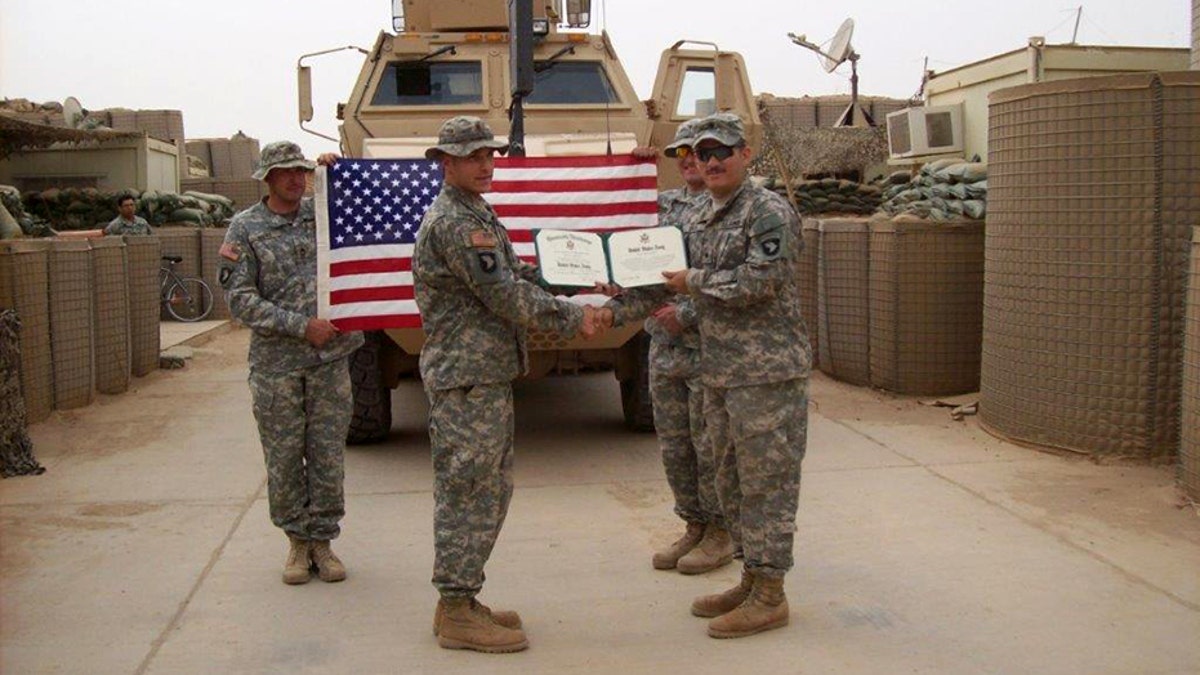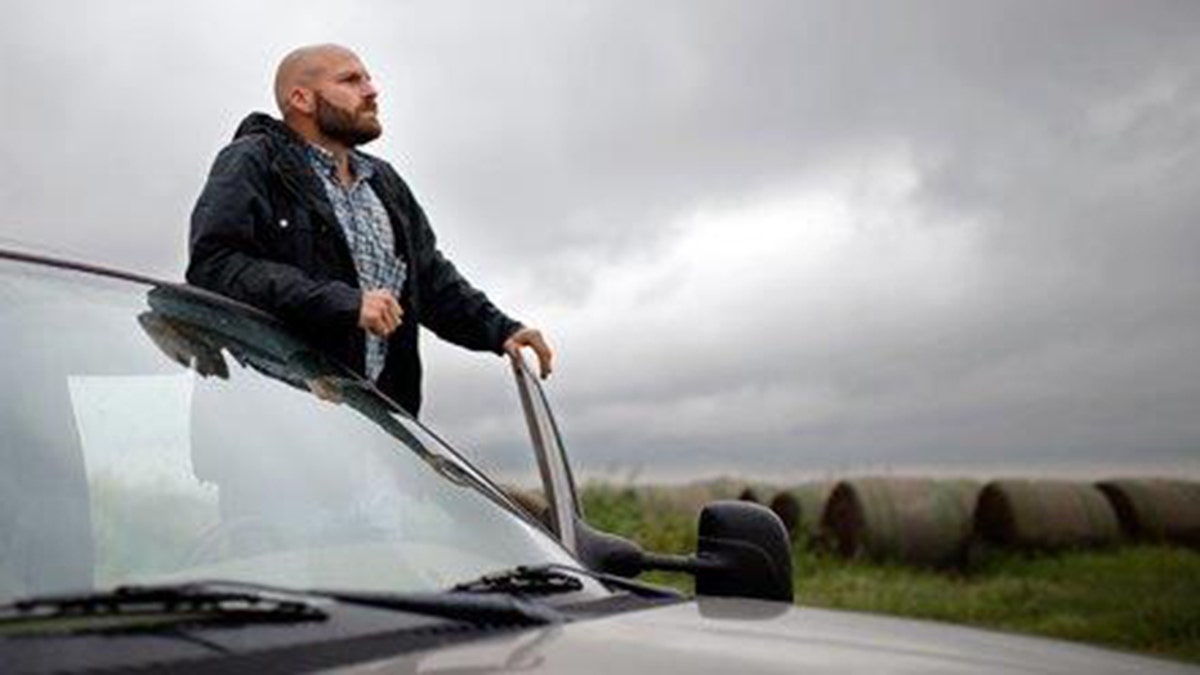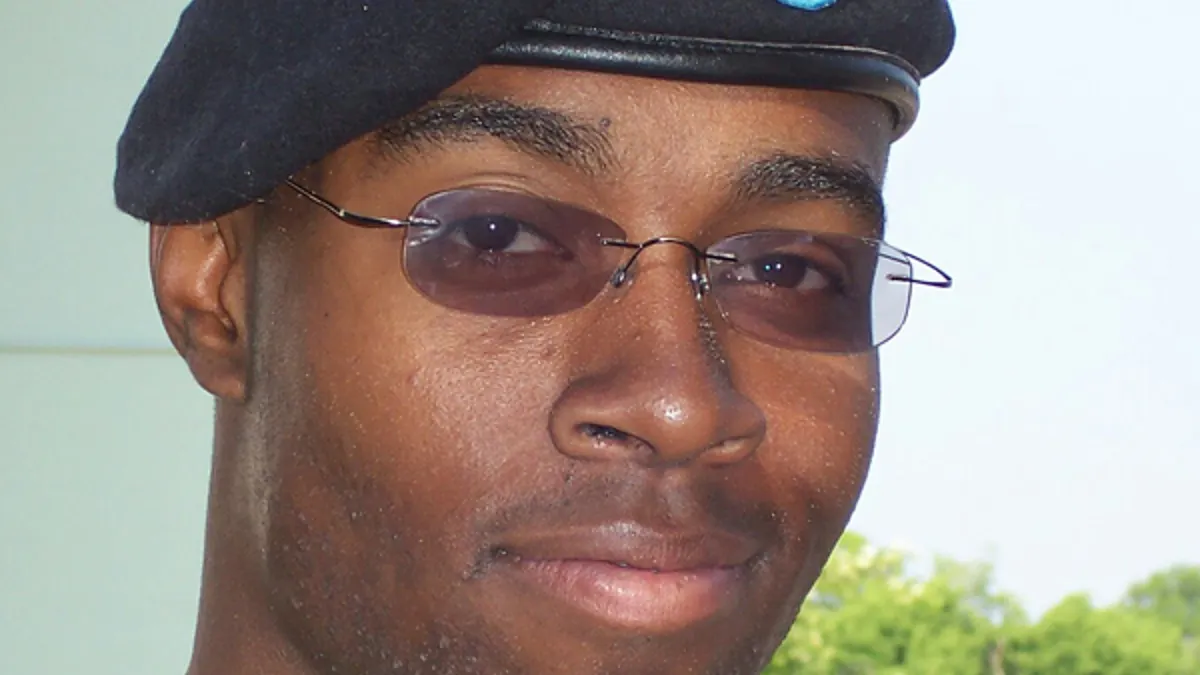
Army 1st Lt. Michael Behenna, in Iraq with some members of his platoon, before he was arrested over the shooting of an Iraqi man in his custody. In the back, right holding the U.S. flag is Adam Kohlhaas, who was killed in a roadside bombing tied to an Al Qaeda cell. (Courtesy of Behenna family)
When Michael Behenna told his parents he wanted to enlist in the Army after the Sept. 11 terrorist attacks, they were proud.
Worried, too.
The Behennas themselves were devoted to careers in public service. Scott Behenna was an FBI intelligence analyst and retired Oklahoma State Bureau of Investigation special agent. Vicki Behenna prosecuted Timothy McVeigh for the lethal Oklahoma City bombing.
But as parents they were fearful that if he were deployed to a battlefield, Michael, the eldest of their three sons, could be maimed or killed.
Instead, First Lt. Michael Behenna returned from Iraq in 2008 with a murder charge. He was found guilty of unpremeditated murder in a combat zone and locked up at the federal penitentiary in Leavenworth, Kan.
Behenna admitted during his trial that instead of taking an Iraqi prisoner, Ali Mansur, home after a 2008 interrogation in Iraq -- as he was ordered to do -- he took him to a railroad culvert. There he stripped Mansur and questioned him at gunpoint about a roadside bombing that had killed two members of Behenna’s platoon, which Behenna had witnessed.
“When you send a child over to fight in a war, the last thing you think you’ll ever have to deal with is seeing him be charged with killing an Al Qaeda" terrorist, Scott Behenna said to Fox News.
Behenna, who was 24 at the time, said he acted in self-defense when Mansur threw a chunk of concrete at him, and reached for the lieutenant’s handgun. The Army said the argument didn’t stand up, because Behenna was already pointing his weapon at the prisoner.
In combat, we can bomb and kill people, even in their sleep. We don’t convict pilots who drop a bomb on the wrong house, and we shouldn’t. Yet if you come face to face with an insurgent, with one individual, and you’re making a split-second decision, you can be prosecuted for murder.
Behenna was sentenced to 25 years in prison, which was reduced to 15. In 2014, when he had served five years, he was granted parole.
Behenna, now 34, is one of about a dozen veterans who were paroled or continue to be held in Leavenworth because of combat-zone crime convictions that many military experts and political leaders say never should have happened. They are seeking a pardon from President Donald Trump, who has so far granted just two – one to former Sheriff Joe Arpaio of Arizona, and the other to a former Navy sailor, Kritian Saucier, who took photos of classified areas in a submarine and served a year in federal prison.
“If these guys messed up, there are administrative ways to handle it. But we charge them with murder,” Scott Behenna told Fox News. “These guys are put on multiple tours, and they’re stressed out. We’re fighting an enemy that has no uniform. These guys had no criminal record, I’d have any of them as my neighbor, even living in my home. They’re phenomenal people. We second-guessed them and put them in prison.”
Scott and Vicki Behenna said the military justice system bewildered and frustrated them. They also said the handling of their son’s case sometimes seemed to run counter –- in ways that shaped key outcomes -- to what would have been done in the civilian world.

Michael Behenna, after his parole in 2014, looking out at a ranch in Medford, Oklahoma where he managed several thousand head of cattle for the owner. Now Behenna runs his own cattle ranch. (Courtesy of Behenna family)
“I understand criminal law, but I was not familiar at all with the UCMJ,” said Vicki Behenna, referring to the Uniform Code of Military Justice.
They say one misstep they believe denied their son a fair trial was the failure of the prosecution to disclose that their own expert's analysis supported Lieutenant Behenna’s version of events. The expert felt so strongly that he reached out to the Behennas about his suppressed findings.
Vicki Behenna said, “As a nation, we should be sympathetic and understanding of the stress and fear” that those in combat operate under when making split-second decisions.
Scott Behenna said the military failed to thoroughly investigate the scene of the shooting in a timely manner.
As a mother, I want that for Michael. I want him to be forgiven, be able to, if and when he has kids, and wants to coach little league, that he’ll be able to do it, and not be prevented because of a criminal conviction.
“In the civilian world, we take whatever time is necessary to do a good crime scene investigation if it could exonerate someone,” he said. “But the military won’t do it.”
Scott Behenna concedes his son erred when he deviated from orders to take Mansur home, taking him elsewhere for an unauthorized interrogation. But he cannot fathom how Behenna and some 11 others who are detained or on parole from Leavenworth based on combat-zone crimes have been treated more harshly than others whose jobs involve split-second, life-and-death decisions.
“Americans released Al Qaeda terrorists and other people” from the military’s Guantanamo Bay detention facility, he said. “We released them, not on parole, we let them go free even though we know a third of them go back [to terrorist activities]. But we don’t give that to our guys.”
Behenna said it makes little sense that there’s discretion granted in cases where the military drops bombs on suspected enemies, and kills innocent civilians in the process.

Sgt. Derrick Miller is serving life for the death an enemy combatant. Miller maintains that the suspect tried to grab his gun and that he shot him in self-defense. (Courtesy of Free Derrick Miller)
“We can bomb and kill people, even in their sleep,” he added, “we don’t convict pilots who drop a bomb on the wrong house, and we shouldn’t. Yet if you come face-to-face with an insurgent, with one individual, and you’re making a split-second decision, you can be prosecuted for murder.”
Last year, Rep. Brian Babin, R-Texas, asked Trump in a letter to review the cases of veterans who fought in Iraq and Afghanistan and are in jail for battlefield crimes. He has not received an official response yet from the White House, he said.
“I’ve had several discussions with senior Trump Administration officials since I sent the letter last year," Babin said to Fox News on Thursday. "It is my sincere belief that these American servicemembers’ cases should be reviewed to ensure that their trials, convictions and sentences were not influenced by political pressures."

The military prison located on the grounds of Fort Leavenworth, Kan. (Reuters)
"This is particularly important considering the release of multiple terrorists and the pardoning of traitors by President Obama," Babin added. "My request is simply for a full, fair and complete review of their cases to ensure they were treated fairly. I have yet to receive an official response but I am still pressing the Administration for one.”
The Behennas say their son has rebuilt his life, and enjoys running his own cattle ranch. He is required to check in with his parole officer, and be listed in the public domain as a felon.
“I understand, legally, what it takes to get a pardon, and how difficult they are to get,” Vicki Behenna said. “As a mother, I want that for Michael. I want him to be forgiven, be able to, if and when he has kids, and wants to coach Little League, that he’ll be able to do it, and not be prevented because of a criminal conviction.”
Many of the other Leavenworth vets have it worse. Some are from poor families, who lack the means to keep their vet’s case in the public eye, or to visit Washington to meet with lawmakers to build support for clemency, a pardon, or a change in the way the military punishes combat zone crimes.
Three of the men remain in jail: Army First Lt. Clint Lorance, Sgt. Derrick Miller, and Master Sgt. John Hatley. The other Leavenworth vets got paroled; one got his conviction overturned. These are the only ones in the group who are still behind bars.
Sgt. Derrick Miller of Maryland was on a combat mission in a Taliban-held area of Afghanistan in September 2010 when he was warned the unit’s base had been penetrated. An Afghani suspected of being an enemy combatant was brought to Miller for interrogation - and ended up dead. Miller claimed the suspect tried to grab his gun, and that he shot him in self-defense. But he was convicted of premeditated murder and sentenced to life in prison.
Army First Lt. Clint Lorance is serving a 20-year sentence for ordering his men to shoot two suspected Taliban scouts in July 2012, in the Kandahar Province of Afghanistan. Lorance had just taken command of the platoon after the prior leader and several others were killed, days before. The Taliban suspects were on motorcycles and matched descriptions given by a pilot who flew over the area earlier and spotted them as scouts.
U.S. Army Master Sgt. John Hatley, a highly decorated 20-year vet who served in Operation Desert Storm and did another three tours during the Iraq War, is serving a life sentence at Leavenworth. His conviction stems from an April, 2007 encounter in Iraq in which he and his unit captured enemies following a firefight.
He radioed a U.S. detention facility to notify officials he was bringing in four prisoners, but was ordered to let them go, according to his legal team.
Two years later, a sergeant who had served with Hatley, Jesse Cunningham, was facing charges for assaulting another officer and falling asleep at his post. As leverage for a plea deal, he told investigators Hatley and two other officers had taken the insurgents to a remote location, blindfolded them and shot each in the back of the head. He claimed their bodies were dumped in a canal - though none were ever found.
Hatley insists he and his men let the insurgents go, but believes he was punished in the interest of the government’s relations with Baghdad.
The Associated Press contributed to this report.









































